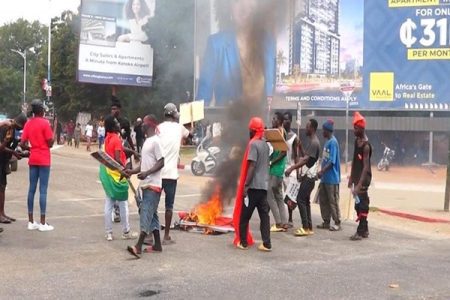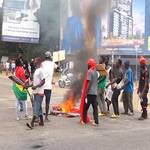The recent police arrest and detention of 54 Democracy Hub protesters during their three-day demonstration have ignited heated debates within the public domain, with some civil society organizations and individuals calling for the release of those detained.
While protest is a legitimate expression of democratic rights, the actions of some protesters on this occasion have raised critical concerns about maintaining public order and upholding the law.
On September 22, 2024, the second day of the Democracy Hub’s protest against illegal mining (galamsey), tensions escalated as some demonstrators engaged in provocative and illegal activities.
Protesters blocked a major road leading to the 37 Military Hospital, posing serious risks to public safety and endangering lives.
Such actions infringe on the rights of other citizens, particularly those requiring access to urgent medical care.
Notably, Oliver Barker-Vormawor, Policy Advisor of Democracy Hub, was caught on video turning off the engine of a police van, seizing the keys, and fleeing the scene.
This act, coupled with protesters blocking the road, pushing police officers, attempting to breach barricades, and even setting fires in the streets, highlights a serious disregard for law and order.
While the demonstrators’ cause—protesting against galamsey—is valid and essential, the manner in which some of them conducted themselves presents a departure from peaceful assembly.
The Ghana Police Service had a responsibility to maintain law and order, and their intervention was not only necessary but, as video evidence shows, measured in the face of considerable provocation.
Critics of the arrests and subsequent remanding of the protestors must acknowledge that Ghana is not alone in enforcing law and order during protests.
Across the world, even in advanced democracies, authorities regularly arrest and prosecute demonstrators who engage in unlawful acts.
Suspended prison sentences for protesters in Germany
For example, in Germany, three climate activists from the “Last Generation” group were given suspended prison sentences for vandalizing the Brandenburg Gate during protests against fossil fuels.
Protesters arrested in France
Similarly, in France, dozens of farmers were arrested for breaking into a major wholesale market during protests.
20 protesters jailed in England
In England, 51 people were arrested after violent clashes during demonstrations following the tragic deaths of three girls.
Twenty of those arrested were handed substantial prison sentences, with one individual receiving up to 28 months in jail.
Detectives are continuing to investigate, and work with the Crown Prosecution Service and the courts to ensure all those responsible for such reprehensible scenes are brought to justice.
5 protesters jailed in UK
Again in the UK, five activists of the Just Stop Oil environmental campaign were handed prison sentences for their involvement in organizing protests that blocked a major London highway in 2022.
One was sentenced to five years’ imprisonment while the remaining four defendants were each handed four years in prison each.
More than 3,000 students arrested in US protests
In the U.S., more than 3,000 students were arrested during Gaza solidarity protests on campuses.
Many are now facing both academic suspensions and criminal charges.
These international examples serve as reminders that while the right to protest is vital in a democratic society; unlawful actions that endanger public safety or obstruct essential services are met with firm legal responses.
The Ghana Police Service demonstrated professionalism and restraint, as evidenced by their response to the actions of the Democracy Hub protesters.
Judiciary criticised
The judiciary has also come under fire for remanding the protesters for two weeks.
Critics argue that the court should have granted bail to the protesters since their actions constitute a misdemeanor.
While freedom of assembly is a cornerstone of democracy, it must be balanced with the responsibility to maintain public safety and protect the rights of others.
Calls for the unconditional release of those arrested overlook the need for accountability in instances where protests turn disruptive.
Upholding law and order
Law enforcement cannot be deterred from acting in the face of disorder, as doing so would risk emboldening further chaos.
While it is crucial to protect the democratic right to protest, it is equally important to uphold law and order.
The actions of some Democracy Hub protesters, including blocking roads and confronting police officers, went beyond the bounds of lawful protest.
As international precedents show, protestors who break the law are subject to arrest and prosecution.
In Ghana, the police must continue to enforce the law without fear of public backlash, ensure that public safety and order are maintained for all citizens.
The discussion should not only focus on the arrests and detention but also on the actions that led to them—actions that threatened the safety and freedom of others.
Disregard false claims of protesters
Meanwhile, the Ghana Police Service has confirmed that all 54 individuals arrested during an unlawful protest organized by Democracy Hub have been arraigned in court.
In a statement issued, Assistant Commissioner of Police (ACP) Grace Ansah-Akrofi, Director of Public Affairs, clarified the situation, addressing public concerns and refuting allegations made by the protest organizers.
False claims of detained child, pregnant woman dispelled
Responding to claims that a 12-year-old child, a 68-year-old woman, and a pregnant woman were among those detained, the police categorically denied these reports.
The statement labeled the accusations as deliberate attempts by the protest organizers to gain public sympathy.
The police urged the public to disregard the false claims.
The police explained that one of the arrested individuals, Grace Asantewaa, aged 50, had been falsely presented as a 68-year-old by the organizers.
During her arrest, she was accompanied by a child, and to avoid separating them, the child was allowed to stay with her at the police station.
The child was provided with food, and Asantewaa was released on bail to care for the child.
The police also noted that Asantewaa has been charged with exposing the child to danger by bringing them to the protest, in violation of the Criminal Offences Act, 1960 (Act 29).
Regarding the alleged pregnant woman, identified as Gloria Vera Louise, the police stated that there were no visible signs of pregnancy at the time of her arrest, and she did not mention any pregnancy during her interactions with the police or in court.
To verify the claim, the police took Louise to two medical facilities for examinations, both of which confirmed that she was not pregnant.
Protest location dispute and court ruling
The police provided a timeline of events leading up to the arrests, starting with a notice from Democracy Hub on July 9, 2024, regarding their intent to hold a protest from September 21 to 23 at Revolution Square, near Jubilee House.
While the police agreed on the protest dates, they advised the organizers to choose an alternative venue, as the proposed location was deemed a security zone.
However, the organizers refused to change the venue.
Subsequently, the police sought a court ruling, and on September 18, the High Court prohibited the use of Revolution Square for the demonstration.
The police emphasized that their court action was aimed at changing the venue, not preventing the protest itself.
Unlawful protest actions and traffic disruptions
Despite police efforts to offer seven alternative locations, the organizers remained defiant, assembling at the 37 Intersection on September 21.
The protest caused significant disruption, including roadblocks with vehicles, stones, and logs, which led to massive traffic congestion across the city.
Demonstrators allegedly set fires, harassed road users, and even attacked police and military personnel.
These actions caused delays in emergency services, hindered access to hospitals, and disrupted funerals and commercial activities.
Many people missed flights, and businesses were unable to operate smoothly due to the protests.
Second day of protest and further arrests
The police stated that after evaluating the first day’s events, they warned the protesters to relocate to one of the proposed sites. When the demonstrators returned to the 37 Intersection the following day and resumed their disruptive actions, the police attempted to engage them peacefully.
However, the demonstrators allegedly attacked the police, with one protester even stealing a police vehicle’s ignition key.
At this point, the police felt they had no choice but to arrest the individuals involved.
The police reaffirmed their commitment to upholding public order and ensuring that demonstrations comply with legal protocols to prevent such disruptions in the future
- Friday, April 4, 2025 Newspaper Headlines - 4 April 2025
- Blewett: MTN CEO, a pilot, author, chartered accountant, marathon runner and many more - 3 April 2025
- MTN Ghana launches Y’ello Ladies Network - 3 April 2025

